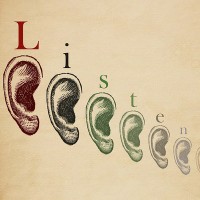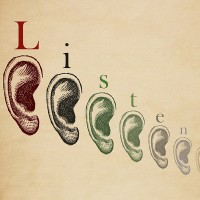Practice the 55-5 rule.
Francis Schaeffer used to say that if you spend one hour in conversation, 55 minutes should be listening and asking questions. We should only hear ourselves talking for 5 minutes.
 Job’s friends should have practiced the 60-0 rule.
Job’s friends should have practiced the 60-0 rule.
Sit down and shut up.
The worst thing we can do when others suffer is
Smother them with our talk.
Stifle them with our lame comments.
Stiff them with our bumper-sticker theology.
Stick them with our human-centered psychology.
Were it not for Job’s three friends talking, Job would have been spared their bad theology, misapplied theology, and lack-of-mercy-theology.
 Were it not for the three friends’ inability to shut up, Job would have been a very short book.
Were it not for the three friends’ inability to shut up, Job would have been a very short book.
Don’t forget: God tells-off the three friends in Job 42, telling them their only hope is if Job prays for them!
Were Job’s friends on social media, they would be posting the latest meme, quote, or diatribe. Their voice would be heard within their own echo chamber.
To my conservative friends I say, beware the air of smugness, thinking you know better than everyone else.
To my liberal friends I say, beware the air of superiority, thinking you are better because you think you are always right.
I want to urge you to actively seek out the most contentious, polarized, gridlocked places you can find. Because so often, throughout our history, those have been the places where progress really happens –- the places where minds are changed, lives transformed, where our great American story unfolds. Michelle Obama, Commencement Address, Oberlin College, May 2015
 You want change? Ask these questions about suffering:
You want change? Ask these questions about suffering:
-
Do we only opine about our own liberal/conservative cause? Are we only indignant about those atrocities that match our view of the world? What does that say about us if we spend all our time only on one side of the “aisle”?
-
Do we spend as much time looking for ways to help as we do ways to yell?
-
Do we show up rather than spout off? Are we constructive in our pain responses? Do we allow our theology to become action?
-
Do our children see us engaged in justice issues? Are they present with us when we write, speak, petition, march, provide for the just cause? Are we mentoring others to take the plow of pain management?
-
Do we “kick ‘em when they’re down” or “shoot our wounded” or laugh at another’s personal pain because their cause/position/perspective does not agree with ours?
 Job addresses responses to suffering that we should be mindful to consider:
Job addresses responses to suffering that we should be mindful to consider:
-
Comfort in our human pain begins with our acceptance of a Divine plan
-
Acknowledge the limits of human wisdom
-
Recognize the incongruity of the wicked prospering & the righteous suffering
-
Be wary of presuming a reason for suffering, knowing God’s agenda
-
Find encouragement not in pious platitudes but in a pietous attitudes
There are times when we want to scream at those who have not suffered, yet want to speak to suffering.
Just shut up and listen!
Dr. Mark Eckel is teaching a fall series on “suffering” at Crossroads Community Church.
Picture credits: https://blog.kennedyviolins.com/2011/03/listen-and-learn/; https://thehealingdiaries.blogspot.com/2012/03/part-6-loneliness-in-bible.html; https://3chicspolitico.com/2015/05/25/first-lady-michelle-obama-delivers-2015-commencement-address-at-oberlin-college/; https://theologyforum.wordpress.com/2008/01/25/up-next-l-ann-jervis-at-the-heart-of-the-gospel-suffering-in-the-earliest-christian-message/




Thanks for the article, Dr. Eckel.
Politically, I guess I’m considered a Centrist. I have difficulty giving my loyalty to the conservative or liberal side. I try to be even-handed and fair when it comes to political views. I do my best to respect and honor authority even when I disagree with them, as I am commanded to in the Scriptures. And I do my best to pay attention to the facts and act accordingly, especially as a man who strives to be Godly.
The picture of the child breaks my heart. I often feel helpless when I see such pictures, knowing I can only do minimal things at this time in my life…and even if I were to donate thousands of dollars, there is no guarantee that it would reach that child and help him. No, the money probably wouldn’t.
…That I were there, I would feed that child and scoop him up in my arms, showing him the love of the Father.
Thank you, again, for this article on suffering, Dr. Eckel. Let us all be encouraged to listen much and speak little.